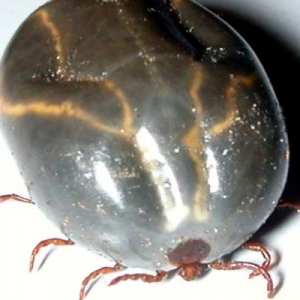BLOODTHIRSTY ADULT TICKS are on a quest right now and farmers in the North Island in tick-prevalent areas should be checking cattle and talking to their veterinarian, say DairyNZ.
They should be assessing their risk in an effort to limit the spread of a new strain of the blood-borne parasite Theileria, says DairyNZ.
Cases of cattle being affected by the new Ikeda strain of Theileria orientalis, which is carried by ticks and causes anaemia, have been on the increase since late 2012, particularly in the upper half of the North Island.
Animal husbandry team leader, Dr Nita Harding says the New Zealand cattle tick is currently in the 'adult' part of its life cycle, and looking to attach and feed on cattle over the next three months. "It's called 'questing' – as the adult tick seeks a host to feed on before it lays eggs," she says.
"The adult tick will only be on the host animal for about a week. After feeding it drops back onto pasture where it lays up to 2000 eggs over a three week period and then dies. Larvae hatch from the eggs three to six months later. These attach to a host animal, feed and return to pasture to develop into the next stage of the life cycle which is the nymph, and then repeat this process to develop from the nymph to the adult tick.
"Theileria is not transmitted from one generation of ticks to the next via eggs, so each new generation of ticks becomes infected by feeding on cattle with Theileria. Reducing the numbers of larvae, nymphs and adult ticks will limit the opportunity for Theileria to be spread within and between herds," she says.
"This is an important stage in the life of the tick right now. While only a small proportion of the adult ticks may be feeding at any one time, and many will be using other animals like rabbits and deer as hosts, we need to do all we can to manage the numbers of ticks laying eggs. Ticks can infest many animal species but they only transmit the Theileria parasite to cattle."
Harding says farmers need to be vigilant in checking cattle for ticks, and talk to their vet about their risk and the options for treatment if they find them. "There are also factsheets on the DairyNZ website (www.dairynz.co.nz/theileria) to help farmers assess their risk status. The Ministry for Primary Industries has summary advice on its website on the most at-risk areas based on tick distribution maps."
Tick facts
• The tick lifecycle consists of four stages – egg, larva, nymph and adult. All stages live at the base of pasture plants. Each stage, apart from eggs, needs to feed on a warm blooded host and finds its host by climbing up plant stems and attaching to a passing animal. Feeding lasts 4-19 days after which the larva, nymph or tick drops off the host and returns to the bottom of the pasture to mature to the next stage, or lay eggs if it is an adult tick.
• The cattle tick, Haemaphysalis longicornis, is small. Adults are about 2.5 mm long. The fully fed adult swells with blood to about the size of a pea. Farmers should look for them around the tail head, base of udder and inside of the legs and in the ears.



















